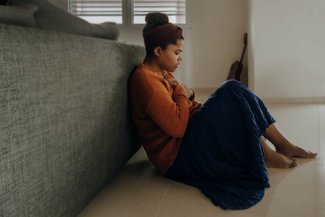
Underexamined and Underreported
Agenda Alliance's briefing on the links between intimate partner violence, suicidality (suicide attempts and suicidal thoughts), and self-harm.

8 Apr 2024
As we enter Spring, our Policy and Public Affairs Officer, Tara, highlights some of what we've done to influence government so far this year.
The Chancellor’s Spring budget statement was anticipated by many organisations across the sector. Women and girls with multiple unmet needs are facing escalating trauma and harm as a direct result of decades of under-investment in public services. This comes as councils across the UK are reporting financial difficulties, with both Nottingham and Birmingham Councils issuing section 114 notices. Birmingham recently signed off £300m in cuts to services, and a 21% increase in council tax over two years [1].
We hoped to see measures in the budget that would address some of those concerns with meaningful, long-term investment into early intervention from relational, cross-cutting services which provide gender- and trauma-informed support. Sadly, the Chancellor missed this opportunity to act: women and/or girls were not mentioned at all in his speech. Across education, criminal justice and health, the budget contained limited support for women and girls facing multiple unmet needs. We needed a budget with prevention at its heart, prioritising the unmet needs of women and girls, but instead we got sticking plasters for longstanding problems.
We signed open letters calling for funding for specialist domestic abuse services (Refuge) and public services (TUC/Fawcett).
A central announcement of the budget was the extension of the household support fund in England from April to September 2024. However, this will not deliver long-term change to the women and girls most in need, and does nothing to address the root causes of poverty or the harm these women and girls experience. 9 out of 10 single parents are mothers, making up the largest percentage of lone parents [2]. Lone parents are much more likely to be in low-paid work, work longer hours, and have increased childcare responsibilities[3]. The support offered in the budget predominantly helps families that are better off, with children's and women’s organisations suggesting that the household support fund extension is a temporary fix for a long-term issue [4]. Given that single parenthood and lower pay are issues disproportionately likely to affect women, we were disappointed that economic responses still lack a gendered approach.
In education, absenteeism is consistently rising; the number of severely absent students has risen 134% since pre-pandemic levels. We also know that Caribbean, Gypsy and Roma, or Irish Traveller communities are being disproportionately excluded, demonstrating a clear need to invest in gender and culturally responsive support in school, but this Budget neglected to specifically support schools at all. This comes at a time when the National Education Union are saying that 70% of schools have less funding in real terms than in 2010, and that they are being asked to do “more and more with less and less” [5]. Schools need dedicated funding for teachers and other school staff to receive gender-, trauma-, age-, and culturally-responsive training so that girls at risk of absenteeism or exclusion can be supported.
We signed Stop the Squeeze’s open letter, calling for Jeremy Hunt to take serious action on the cost-of-living crisis.
We had hoped that the Budget would deliver continued funding to criminal justice, including for the Female Offenders Strategy and new, dedicated funding to ensure delivery of the Young Women’s Strategy in the Budget [6]. However, the Spring budget showed that The Ministry of Justice will see a decline in their resource budget, from £10.5 billion to £10.0 billion in 2024-25. This could have significant impacts on women and girls in contact with the criminal justice system, where their needs are often overlooked due to their minority status. A decline in overall funding creates pressure on services overall, and we are concerned that specialist support for women will be deprioritised even further. This budget missed the opportunity to invest meaningfully in preventative early intervention and diversion measures which are gender-, age-, trauma- and culturally-responsive, to stop women and girls entering the justice system in the first place.
Finally, the urgent need for specific funding to support women and girls' mental health was left unaddressed. Girls and young women are disproportionately impacted by mental health challenges, and are more likely to experience certain anxiety and depression than men and boys, yet much of the support on offer is generic and underfunded. Our research has found that over a quarter of young women aged 16 to 24 have symptoms of depression or anxiety, experiencing this at three times the rate of their male counterparts and at higher rates than older women [7]. The Budget also neglected to provide dedicated funds for suicide prevention despite the recent updates to the Suicide Prevention Strategy, which recognised a clear link between suicidality and domestic abuse. Given this, we were particularly disappointed that women and girls were not referenced at all in the speech in regards to health.
Ultimately, the Chancellor’s budget ignored the significant implications of decades of underfunding public services for women and girls with multiple unmet needs. We will continue to advocate for consistent funding to enable cross-departmental, holistic public services which deliver early intervention and preventative support, and to champion the specialist women’s organisations delivering this work.
On 5 March, HM Inspectorate of Prisons’ on Wetherby Young Offender Institution (YOI), which holds girls and boys, released a troubling report regarding the treatment of children in custody, including using pain-inducing force and strip searches. In one instance, a girl was restrained and strip-searched twice by an all-male group of officers to prevent her from self-harming. Self-harm in Wetherby YOI is the highest in the country, and girls account for “extremely high” levels of self-harm [8].
Agenda Alliance’s own recent research has focused on the significant rates of self-harm among young women in prison, whose needs go unmet due to lack of appropriate tailored support which responds to both their gender and age. The report clearly demonstrates that this tailored support is lacking at YOI Wetherby, and we shared our joint concerns about this alongside Women in Prison.
We were pleased to see the action plan from HMPPS addressing the situation at YOI Wetherby. However, we know that what is desperately needed for girls in youth custody and young women who have recently transitioned into adult custody settings is trauma-, age-, gender-, and culturally-responsive support, with an urgent need for training for all staff members. Longer term, we hope to see an end to the imprisonment of girls, and instead see crucial investment in trauma-informed community solutions.
We support the Howard League’s campaign to move all girls out of YOI Wetherby – you can find out more and sign their petition here.
We welcomed Dame Diana Johnson’s amendment to the Criminal Justice Bill on the decriminalisation of abortion. For reproductive healthcare and rights to be truly accessible, those that need professional care prior to, after aborting, or losing a pregnancy must have trust in the systems that exist to support them. Concerns that healthcare professionals will report them to authorities directly contradict this.
Decriminalising abortion is fundamental to providing gender-responsive healthcare. We further urge policymakers to consider how this amendment could be strengthened by increasing access to support services which are gender-, age-, trauma- and culturally-responsive. Policy must change so that women who have taken decisions about their bodies into their own hands and sought abortions, or those who have suffered pregnancy loss, can access appropriate care and feel safe from punitive action.
We are supporting our member, MSI Choices, in their campaign around support for this amendment – you can find out more and email your MP here.
If you would like to contact us regarding any of the policy issues raised in this blog, or any other policy work you think aligns with our projects, please contact our Policy and Public Affairs Officer, Tara.
References:
1] BCC News (2024) Birmingham City Council signs off 'devastating' cuts
2] Women’s Budget Group (2021) Economic challenges for single mothers
3] Ibid
4] Action for Children (2024) Action for Children responds to the Chancellor’s Spring Budget, Oxfam (2024) Oxfam’s response to the Government’s budget
5] National Education Union (2024) Spring Budget 2024
6] Ministry of Justice (2022) Millions invested to support female offenders
7] Agenda Alliance (2022) Girls Speak
8] HM Chief Inspector of Prisons (2023) Report on an unannounced inspection of HMYOI Wetherby

Agenda Alliance's briefing on the links between intimate partner violence, suicidality (suicide attempts and suicidal thoughts), and self-harm.

Mind and Agenda are calling for investment in tailored mental health support for women, following a £1.8m Tampon Tax-funded pilot programme of women-only peer support.

The Government's new Suicide Prevention Strategy published today is a welcome step but must be driven by a cross-sector commitment and properly resourced to improve the lives of women and girls with unmet needs.